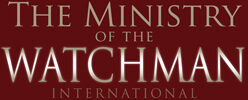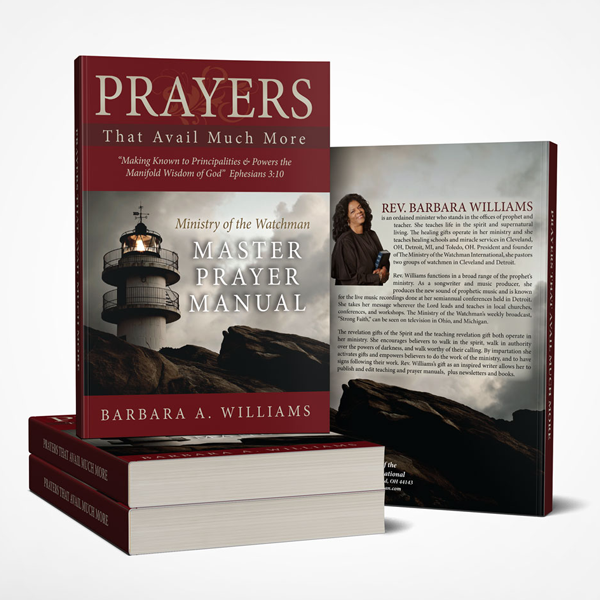“For we wrestle not against flesh and blood, but against principalities, against powers, against the rulers of the darkness of this world, against spiritual wickedness in high places.” Ephesians 6:12
Who Is The Watchman?
People come up to me at meetings where I preach and tell me that God has told them they are watchmen. Seldom do I find anyone who can tell me anything about this ministry. They always say, “I’m a watchman on the wall.” Sometimes I think, “off the wall is more like it.” It’s amazing how believers feel that somehow ministry comes naturally.
We’ll think nothing of going to medical school, law school, or even driving school to learn our trade, but seldom do we think of a school of ministry if we are called to ministry. Or, we assume that we’ll be taught everything we need to know in the local church setting. Traditionally, the local church is designed for the care and nurturing of the sheep, and not for teaching ministers. It did not begin this way, but down through the ages, the church has changed.
Unfortunately most local churches are one-gift oriented. The pastor preaches, teaches, counsels, and administers. It takes the ministry of all five to mature us and prepare us for ministry (Eph. 4:11-12).
Some people will come out of their comfort zones of Sunday/Wednesday services for a little refreshing at a conference, but are reluctant to commit to consistent teaching. Our traditions hinder us sometimes from seeking to be properly trained for our ministries.
Functions of the Watchman
So who is the watchman? The Watchman is one who is assigned a specific list of duties in prayer and warfare that have the following functions for the body of Christ: protection, defense, observation, warning, revelation, offense, execution of written judgments upon principalities and powers, establishing Divine government of the church, preparing the way of the Lord, and carrying out the Word of the Lord.
As you can see, these duties are consistent with the office of the prophet, and where some duties had a natural execution under the old covenant, they have spiritual executions under the New Covenant.
The ministry of the watchman is a ministry of prayer that deals with the confrontation of evil on several levels of spiritual authority:
Principality:
(Strong, Gk. 746) “arche.” A commencement, chief, beginning, corner, the first estate, principality.” The highest level of demonic rule (under satan). Includes evil princes who rule countries or geographical regions. Usually political, but sometimes religious leaders (Dan. 10:13).
Power:
(Strong Gk. 1849) “exousia” privilege, force, capacity, competency, magistrate, superhuman, potentate, token of control, delegated influence, authority, jurisdiction, liberty, power. This is probably the second level of authority. The magistrate or sheriff rules and enforces satan’s dark laws in a smaller geographical area.
Ruler of darkness:
(Strong Gk. 2888, “kosmoskrator,” world ruler (satan); and 4655, “skotos,” darkness, obscurity, shadiness. The term here describes one who rules in the shadows, behind the scenes, or in a deceptive way. Demons who whisper evil thoughts and bombard the mind with wicked ideas are included here. These work on the person’s mind to tempt one in one’s personal decisions.
Spiritual wickedness in heavenly places:
(Strong Gk. 4152 “pneumatikos,” non-human. non-carnal, religious, spiritual, supernatural; and 4189. “Poneria,” depravity, malice, plots, sins. iniquity, wickedness. There is human wickedness. Violence, cursing, excesses in the flesh, controlling, demanding behaviors are all works of the flesh exclusively used to satisfy the flesh. That is not what is being spoken of here. Spiritual wickedness has a supernatural and superhuman origin, but it may affect the human flesh or mind. Examples include epidemics of colds or flu, which are caused by unusually large concentrations of germs, or irritants in the atmosphere (demonic plot to destroy health); demonic visitations designed to frighten people are another example (demonic plot to steal peace).
This ministry is a function of the office of the prophet. Prophets were in old times called “seers” (1 Samuel 9:9) so the watchman had to “see” into the spirit what God wants him to see and take authority over forces of spiritual darkness that hold people in bondage to sin and darkness.
Because the watchman in called to see, he peers into the distance and can foretell danger from a distance, or can sense imminent danger. (2 Samuel 18:24-27 / 2 Kings 9:17-21). The anointing for the watchman originates from the office of the prophet, and includes the operation of the revelation gifts of the spirit as well as the gifts of prophecy. From this grace, the watchman is able to speak to principalities, powers, thrones, and dominions and cause them to hear the manifold wisdom of God. When devils are put into their place, spiritual atmospheres change, people change, laws change. There is an actual shifting in government as a result of the activities of the watchman.
The person who is a watchman is called by God to fulfill this role. All Christians are called to a life of prayer, and are allowed to intercede for anyone, but the function, role, training and behavior of the watchman are different from simple intercessory prayer in the following ways.
Origin of authority:
The watchman derives his authority, training, and anointing from the office of the prophet. This is consistent with the Bible. All the watchmen mentioned in the Bible were prophets. (Ezekiel 3:17/Jeremiah 51:11).
Duties:
The watchman was given his assignment by God, and was held accountable to God for the completion of it. He went from assignment to assignment. He did not pray for a “season” and then does something else. The watchman was called for life. (Habakkuk 2:1-3). The watchman was given the vision from God, and told to report what he saw. If he answered correctly, God told him what to do about what he saw. Elijah prayed earnestly that it would not rain, and it did not rain for three years. He came close to perishing in the drought. King Ahab sought his life because of the drought, but the drought was ordered by God. The true watchman never questions God’s instructions; he just carries them out. (1 Kings 17:1-7, 18:1-2/ James 5:17)
The watchman, as prophet, may be called upon to preach to the people and declare what God has said. (Isaiah 21:6 / Ezekiel 33:7) HE DOES THIS BY UNCTION, AND NOT OF HIS OWN ACCORD. The watchman must have the discipline over his mouth that a soldier has over his finest weapon. The mouth of the watchman is his greatest weapon. It can be used for much good or much evil.
Training:
This is the most difficult part for most people to accept. The watchman must be trained by a prophet. While many people can pray, and are told by God to pray, we are not talking about one who prays a lot and calls himself an intercessor, but one who accepts this as a calling from God, and seeks to be fully equipped to do the job. Since the ministry of the watchman is a function of the office of the prophet, one can only receive that anointing from a prophet who functions as a watchman. Anointings originate with the Lord Jesus Christ. Whether you get your anointing directly from the Chief prophet or from a human who stands in the office of prophet and functions as a watchman, there must be spiritual training put into every human spirit before one can understand and perform the duties of this office.



